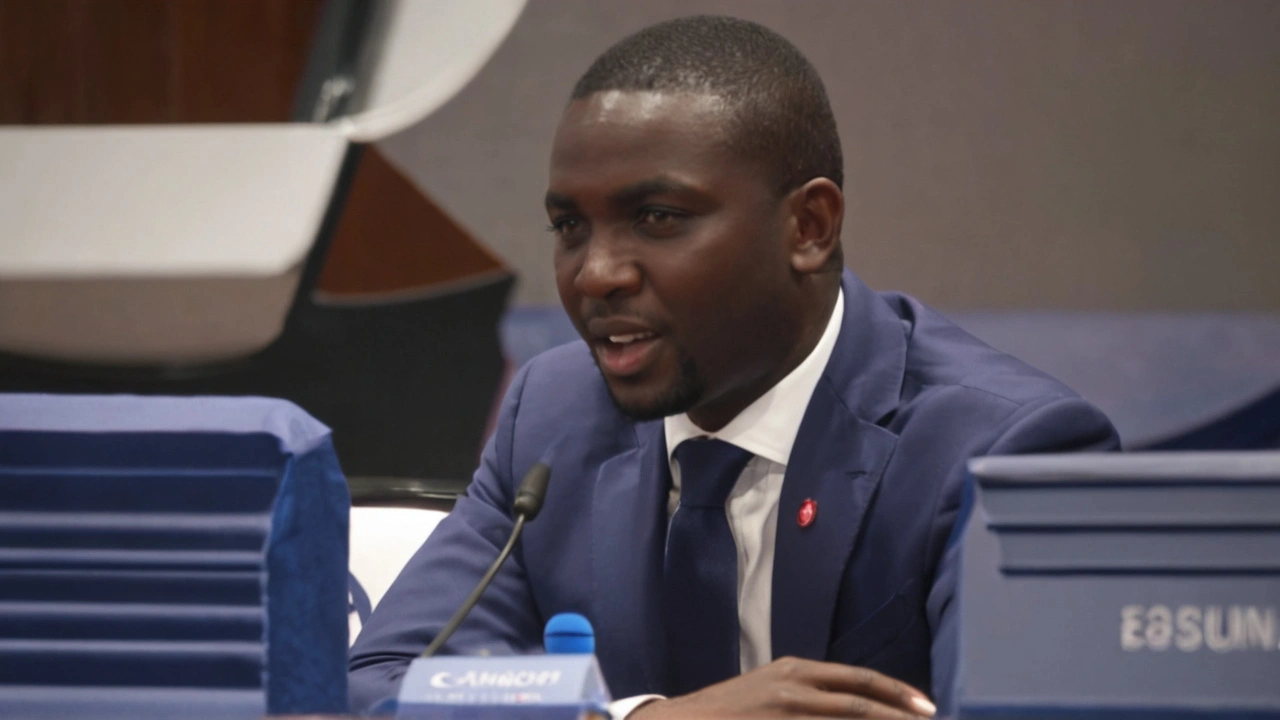Introduction
In a recent development that has sparked substantial debate within Kenya's political corridors, Edwin Sifuna, the Secretary General of the Orange Democratic Movement (ODM), has issued a stern directive to four party members who have been nominated to President William Ruto's Cabinet. The nominees, who include prominent figures John Mbadi, Opiyo Wandayi, Hassan Joho, and Wycliffe Oparanya, have been urged to resign from their party positions before proceeding to Parliament for vetting. Sifuna contends that these nominations do not reflect the party's stance and were not a product of ODM's recommendations.
The Call for Resignation
Edwin Sifuna's call for resignation is rooted in the legal framework that governs appointment to Cabinet positions in Kenya. According to Sifuna, the law is unequivocal in its requirement that individuals holding political party positions must relinquish these roles if they are to be considered for Cabinet appointments. This has put the four nominated members in a precarious situation, as their continued association with ODM could contravene existing legal provisions.
Addressing these concerns, Sifuna emphasized that the decision to nominate John Mbadi, Opiyo Wandayi, Hassan Joho, and Wycliffe Oparanya was not orchestrated by ODM as a collective body. Instead, he claims that these nominations were personal agreements between the individual nominees and President William Ruto. This statement has created a stir within ODM, highlighting a potential rift between party members and the higher echelons of leadership.

Implications for ODM
The directive from Sifuna comes at a critical juncture for ODM, which has long been seen as a formidable force in Kenya's political landscape. The controversy surrounding the nominations and the subsequent call for resignations could have far-reaching implications for the party's unity and strategic direction. Sifuna’s remarks underscore the importance of adhering to the party's internal protocols and maintaining a unified front in the face of external challenges.
Moreover, Sifuna took the opportunity to underline the diverse nature of ODM. He pointed out that Raila Odinga, the party leader, would not have endorsed the nomination of two individuals from the same region, as this conflicts with the party's principles of inclusivity and regional representation. This assertion further questions the legitimacy of the nominations and calls into question the real motivations behind them.
The Party Leader's Stance
Raila Odinga, a seasoned politician and a central figure in ODM, has not yet made a public statement regarding the nominations. However, Sifuna's comments suggest that Odinga was not involved in the decision-making process, which adds another layer of complexity to the situation. The absence of Odinga's endorsement raises questions about the internal dynamics of the party and the degree of autonomy exercised by its members.
Sifuna’s insistence on adhering to the party's norms and procedures reflects ODM's ongoing efforts to preserve its integrity and uphold its values. The Secretary General's call for resignation is an attempt to ensure that the party operates within the confines of the law and continues to function as a cohesive entity.

Conclusion
The unfolding events surrounding the ODM nominations to President William Ruto’s Cabinet offer a glimpse into the intricate and often tumultuous world of Kenyan politics. Edwin Sifuna's firm stance on the need for resignation underscores the importance of legal compliance and party unity. As the nation watches closely, the actions of the nominated individuals and the overall response of ODM will undoubtedly shape the political landscape in the days to come.
Whatever the outcome, this episode serves as a reminder of the dynamic nature of political alliances and the constant need for strategic decision-making. It also highlights the critical role of party structures in maintaining order and coherence within political movements. For ODM, the path forward will require careful navigation of these challenges to ensure its continued influence and relevance in Kenya’s political arena.


Diego Vargas
July 25, 2024 AT 20:35I think Sifuna is just following the rulebook, even if some folks think it's too strict. The law is clear about party positions needing to be vacated before a cabinet slot. It might look like political theatre, but the legal side can’t be ignored. Also, it sends a message that ODM cares about internal discipline. Still, the timing is kinda odd, definately a strategic move.
Alex Lee
July 25, 2024 AT 20:36These nominees are just trying to cash in on Ruto’s favor. Sifuna calling them out is the only sane thing.
Vida Yamini
July 25, 2024 AT 20:40It’s really important to look at the bigger picture here and see how party cohesion can be affected by these kinds of moves
When leaders bend the rules it can create a ripple effect across the entire organization
Members might feel that the party’s principles are being overlooked for personal gain
That could lead to a loss of trust among grassroots supporters who value transparency and fairness
On the other hand, some might argue that flexibility is necessary in a fluid political environment
But the core values of ODM, like inclusivity and regional representation, should remain untouchable
If the party starts making exceptions, it could set a dangerous precedent for future nominations
Raila Odinga’s silence might be a tactical pause, but it also fuels speculation about internal disagreements
When a party’s secretary general steps forward, it signals that there’s a serious concern about process
The law is quite explicit: holding a party office while seeking a cabinet post is not allowed
This isn’t just a bureaucratic hurdle, it’s about maintaining democratic integrity within the system
People want to see that leaders are held accountable, not given a free pass based on personal agreements
Moreover, the regional balance that ODM prides itself on could be tipped if two nominees from the same area get cabinet posts
This could alienate other regions that feel underrepresented
Such alienation can weaken the party’s national appeal and electoral prospects
It’s also worth noting that the public perception of ODM could shift if it appears to tolerate back‑door deals
In politics, perception often translates into voter confidence or doubt
In the end, Sifuna’s insistence on resignation is a stand for the party’s own rules and identity
It’s about keeping ODM’s voice strong and consistent, especially when the political climate is so charged.
Keeping this dialogue open is essential for the health of our democracy.
James Lawyer
July 25, 2024 AT 20:43The legal framework here is quite explicit-any individual holding a party office must step down before assuming a ministerial role. This safeguards against conflicts of interest and upholds the integrity of both the party and the state. Sifuna’s demand therefore aligns with statutory requirements rather than mere political posturing. It also reinforces the principle that party decisions should be collective, not unilateral.
Abby Culbertson
July 25, 2024 AT 20:46this is just drama unfoldin fast.
Awolumate Muhammed Abayomi
July 25, 2024 AT 20:50Yo fam, I see the energy in this debate and we gotta stay united as a team! Even if things look messy, we can turn it into a chance to show our strength. Let's keep the vibe positive and push for clear decisions that respect our values. Together we can keep the momentum going, no matter the obstacles.
Josh Tate
July 25, 2024 AT 20:53I get why Sifuna is stressing the point, the party deserves clear rules. It’s tough when politics gets messy but staying honest matters. Also, the members deserve to know they’re not being used for personal deals. At the end of the day, transparency keeps the trust alive.
John Smith
July 25, 2024 AT 20:56Honestly, the whole thing feels like a circus. Sifuna is playing the rulebook, but maybe he’s also protecting his own influence. The nominees probably thought they could skate by, but reality bites. It’s a reminder that politics is rarely clean, and every move has a hidden angle.
Alex Soete
July 25, 2024 AT 21:00Let’s keep the momentum up and encourage everyone to stay focused on the party’s core mission. Energy like this can be channeled into constructive dialogue, not just criticism. We all want ODM to stay strong and united, so let’s push for solutions that respect the rules while keeping our goals in sight. Together, we can turn this controversy into a catalyst for positive change.
Cara McKinzie
July 25, 2024 AT 21:03Another drama episode, and I’m not surprised. The whole thing feels staged for headlines.
Joseph Conlon
July 25, 2024 AT 21:06While many are quick to side with Sifuna, it’s worth examining the broader implications of forcing resignations under pressure. The party’s internal democracy could suffer if members feel coerced rather than persuaded. Moreover, the public may perceive this as an internal power struggle rather than a principled stand. It raises the question of whether the emphasis should be on procedure or on fostering genuine consensus. In any case, the conversation should move beyond binary judgments to consider the long‑term health of ODM.
Mohit Singh
July 25, 2024 AT 21:10Looks like they’re just playing games. The aggressive stance only fuels more tension. It’s a passive‑aggressive way to show who’s in charge, and it doesn’t help anyone.
Damian Liszkiewicz
July 25, 2024 AT 21:13🧠 It’s fascinating how internal dynamics shape the public narrative. The balance between principle and pragmatism is delicate, and every decision echoes beyond the party walls. 🤔 When leaders prioritize procedural integrity, they also reinforce trust among constituents. 🌍 Let’s hope this moment sparks a deeper reflection on the values that guide our political journey.
Angela Arribas
July 25, 2024 AT 21:16Wow, another opportunity to correct punctuation. This post lacks the proper commas, periods, and capitalisation. 🙄
Sienna Ficken
July 25, 2024 AT 21:20Well, isn’t this just a masterclass in political theater? The colourful language is almost as vivid as the drama. A little sarcasm never hurt anyone, especially when the facts are so… predictable. Let’s hope the next act brings some genuine substance.
Zac Death
July 25, 2024 AT 21:23Hey folks, I’m just watching this unfold and thinking about the bigger picture. It’s easy to get caught up in the nit‑picking, but we should remember why we care about party principles in the first place. Let’s keep the conversation chill and constructive, focusing on what truly matters for ODM’s future. The energy here is high, but we can channel it into something positive. Stay cool, stay engaged.
Lizzie Fournier
July 25, 2024 AT 21:26We need to keep the dialogue inclusive and supportive, remembering that every member’s voice matters. Even when opinions clash, a calm approach helps us find common ground. Let’s stay open‑minded and work towards solutions that respect both the rules and the people.
JAN SAE
July 25, 2024 AT 21:30Look, the core issue here, clearly, is the need for compliance, and, secondly, the preservation of party integrity; both are non‑negotiable, and, finally, the broader impact on voter trust must be considered-thus, the call for resignation, while severe, aligns perfectly with established protocol, and, importantly, it sends a strong message about accountability.